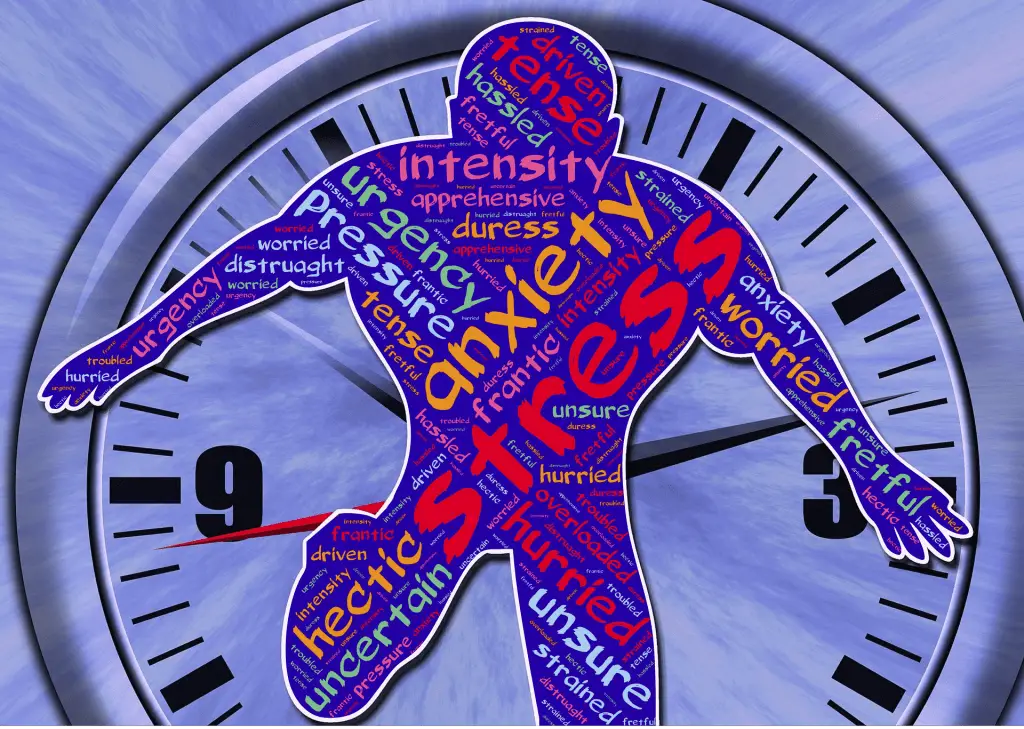Job stress amidst virus pandemic might be real. Work is something that takes up a significant chunk of adult life, around 40-80 of our productive hours each week. It totally makes sense that we feel our stressful jobs affects us mentally and physically during our downtime.
The pandemic has burdened working parents with added responsibilities at home, like managing kids’ schooling and summer activity, along with their work responsibilities.
A recent study by Harvard confirms that nearly half (44 percent) of working adults say that their current job affects their overall health.
People with disabilities, in dangerous or low paying jobs, and those in retail are most likely to have a negative impact on their stress levels (43%), eating habits (28%), sleeping patterns (27%) and weight (22%)
But even if you’re in a miserable position right now, can it make any sense to resign amid a global pandemic?
Experts predict that the global economy will be hurting for a long time. It might be years before unemployment rates reach pre-pandemic levels.
If you have a job that’s causing you lots of stress, affecting your health negatively, and otherwise making you miserable, it’s important to remember you do have choices.
It may not always feel that way, with bills looming and a mortgage or rent to pay. But there are several steps you can take to improve your situation.
What is Job Stress?
Job stress is physical, mental or emotional strain in response to demands and expectations that employees experience at the work place. Stress on the job is influenced by their relationships with colleagues and managers and leadership team. Job stress can lead to poor physical and mental health and in rare cases, even injury.
Stress at work is often confused with challenges, but these are not the same. Challenge energizes us psychologically to learn new skills and master our jobs. There is an inherent motivation cycle going on. When we finish a challenge, we feel amazing. Thus, challenge is the principal ingredient for productive work. A little bit of stress through challenges is always good for you. It makes you grow.
Job Stress can be
- Negative stress or distress may result in harmful things physically and emotionally, when the requirements of the job do not match the capabilities, resources or the worker needs. Signs and symptoms of negative stress in employees can be found in increase of blood pressure, insomnia and inattention.
- Positive stress or eustress is a positive response through stress employees experience and then good things happen because of that. They feel in control. As long as employees believe they have adequate knowledge, skills and abilities, the stress they experience will be positive. Positive stress may result in increased productivity and healthy work environment helping other employees.
But, we are going to talk about the distress side of things going forward. Almost everyone emphasize that job stress results from colleague interaction and work conditions. This type of stress employees experience depends on what they believe, perceive and feel.
Root Cause of Stressors
Firstly, you need to understand what is the primary cause of your job stress.
Do you have a burn out?
Are you performing a role you don’t have expertise in?
Is it difficult to work from home and care for your kids?
Is work taking up more time now, even without the commute, causing work life balance to go for a toss?

According to American Psychological Association, maintaining a journal is a good way to identify your specific stressors and recording your thoughts can be helpful.
Get to the minute detail and understand even the hour of day or recurring situations that is likely to cause your stress to rise. Finding patterns in your reactions is the first step in fixing it. It can help you have a better understanding of what your next steps can be.
Is it the Boss or Coworkers?
Are you working with a terrible boss or difficult colleague?
There following steps can help you to protect yourself
Firstly, have a meeting with HR. Make sure you have proofs (date, interaction details, what was unprofessional etc) for every inappropriate action. Request the HR to document these issues and start a formal interrogation.
Secondly, for your peace of mind, consider sharing the same with a trusted mentor, your spouse or a close friend. This will help you get different perspectives, feedback and much needed emotional support.
You may not be able to do anything about your boss while you are at work, but you can protect yourself in the case of being unfairly terminated at work. There are laws that require the victim to be given fair share of rights and representation.
If you are physically threatened in any way, you might want to consider reporting this behavior to the harassment authorities and leave the situation immediately.
Unemployment insurance often allows workers in dangerous job situations to file claims, even on voluntary separation. Check with your State on the guidelines.
Is it the difficult tasks?
Are you expected to perform a role or job duties that you don’t have qualifications for?
Can you develop it quickly?
If yes, you might want to take an online course or a physical bootcamp course. If you are good at picking up new skills, this temporary stress will go away when you actually finish learning it.
New skills can boost your confidence immensely and help you face work stress situation feel manageable.
If you can’t develop skills for the job, it is better to look out for “jobs with less stress” or the ones that makes you an exact fit for an eustress job.
Are You Burned out?
If you feel you have a burn out in your job, it may be that you need a break. When is the last time you took a vacation from work? Managing vacation time properly could destress you and make wonders for your mental health.

How long have you been doing the same work? Is there any scope of increased responsibilties? If you are doing the same thing over and over for years, you’re eventually going to hate the job. Think of the opportunities and talk to your manger to expand the scope of your role constantly every quarter.
You could ask me, hey, is it safe going out during Covid Virus Pandemic? I’ll leave it to your decision. Decide based on the active number of cases and deaths in your country and state.
If you want to take a defensive approach, considering doing a full one week staycation. This can do wonders to your mental health and might even make you love your work more. Do you still feel the Monday Morning Blues on the seventh day of your vacation? You should consider a job with low stress then.
Alternatively, you might consider doing part time work that allows you better balance work and life. Just ask, will I be able to manage financially? If yes, this can be a great way to achieve more work life balance and help reduce burnout.
Find Your Alternatives than Leaving Your Stressful Job
It is easy for anyone to say “quit your job” when others seek advice. Let’s not go full irrational, unless the situation absolutely demands it.
Do you fantasize showing two middle fingers to your job? Then, work towards it. Early retirement is not easy and not for everyone. If you’re not in a good economic position to leave, consider other ways of managing a stressful work environment first.
Consider having an open conversation with your boss or skip level manager.

Undoubtedly, your company has other employees in the same situation who need flexible jobs, so don’t be shy in discussing with your manager. Instead of quitting, you can negotiate agreements with your employer, that is a win-win for both employer and employee.
Feeling overwhelmed during Pandemic? Consider a burnout nursing digital nomad trip to Barbados or Antigua Barbuda, if you can do the work remotely from these paradise islands. Discuss the possibility of a sabbatical, leave of absence, or reduced hours if the going remote plan doesn’t work.

How To Mitigate Job Stress?
You can take a few simple steps to conquer the job stress problem.
Firstly, concentrate on improving your relationships at work. Join happy hour meetings or lunch meetings and get to know your coworkers better.
Can you have an informal lunch date with your close coworker? Hit them up and let them know you need help
Focus especially on improving your relationships with your boss or super boss or someone else in the company, in order to portray a positive image in the workplace.
Secondly, your environment can be the next stressor.
If you’re working from home, take enough 5 minute breaks and get some fresh air.
Play your music on the background if it doesn’t affect your productivity.
Lastly, check if you need a counselor service. If you feel you need help, don’t think twice to reach out and get help.

Many therapists are offering virtual sessions over Zoom meetings, making it easier than ever to talk through your problems and provide necessary support. Check your employee benefits that may pay for the service. Employee mental health is important for the employer, so they generally cover it!
Plan for the Worst Case Scenario
It doesn’t make sense to stay, if you face harassment or inequality or racial issues and the HR doesn’t want to take action. In extreme cases, where leaving your stressful job is the only option, make sure to clearly plan for worst case scenario
What if you can’t find a new job after quitting your job?
How about the negative impact to your natural career progression?
What if only low paying offers reach your way?
Do you have your skills intact to land your next job quickly?
Once you question yourself and get clear answers or plans for each of those, you will become ready to take the ultimate step of quitting your job. If any of these scenarios sound scary to you, you are not yet ready to quit.
Think rationally before taking big decisions. Use your brain and not your heart. Emotional decisions can cost you a lot later. Finally, if you have a sound plan on what is your next adventure and how it will support you in your life goals, you sound ready to quit your job. But wait, there is one more step!
Assess Your Financial Situation
Before you quit your job, you need to thoroughly assess your finances.
- What is your debt situation?
- Have a fully loaded up emergency fund?
- What is your Net worth?
- What do those minimum payments look like?
- Do you have other sources of income?
- What is your survival rate without active income from job?
Do these questions make you uncomfortable? Then you’ll definitely need to spend some time evaluating your personal finance.
You will need to review the last six months of expenses to get a real idea of your average spending each month.
Download credit card and bank statements. Enter the expenses into a spreadsheet for recordkeeping. Just do a simple math to average out the expenditures over the six months data. Also, look at your category wise spending and find opportunities to reduce them as you take this big next step.
Any recurring bills should not be missed. Include future minimum payments in your total. This will help you save more and curtail your spending habit naturally.
Do you have enough liquid money saved acting as cash cushion for 6 months to a year?

If you don’t have even 6 months expenses saved, then it is worth avoiding to resign your active job just yet if you can. Quickly, form a short term goal of increasing your savings until you get there and then quit your job, if you need to, at that point.
Taking a small action like increasing your savings rate and seeing the cash flow in your account can give you sense of control over your employment situation. It can improve your confidence at workplace and what seemed daunting could now suddenly become heaven.
Parting Thought – Time To Escape From Job Stress?
If it’s just a normal job stress, everyone faces it in the current pandemic scenario. So, talk it through with your loved ones and you will get clear perspectives.
In today’s work environment, line up your next opportunity before leaving your current employer is the smartest thing to do. Keep searching for jobs that you love on the side, if you don’t love what you do right now.
Assess all of your options with your employer before jumping ship. Sometimes, they may be willing to accommodate more than you think. Never just assume.
Ask yourself tough questions on your personal finance situation before thinking of quitting your job. Building a side hustle and becoming a business owner is never a bad idea during the lockdown.
Avoid troubles at the workplace as much as you can. If you have a serious situation that mentally or physically affects you, you may have no other choice but to quit your position. Never even think twice to quit a dangerous workplace situation.
